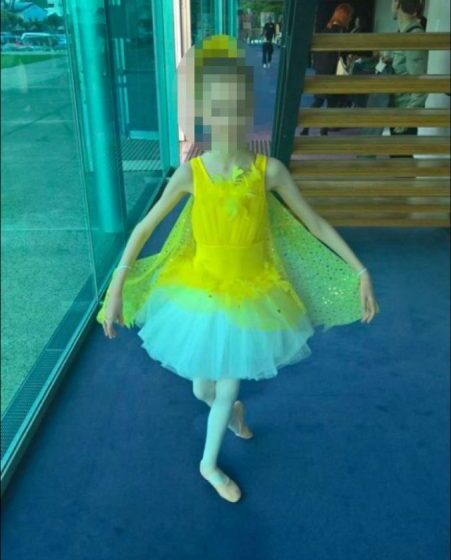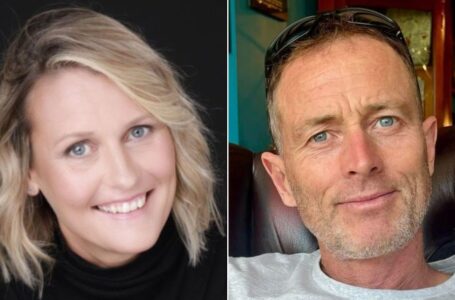Ballerina’s parents jailed for neglecting the daughter they bathed in attention but starved of food


By the time the girl was admitted to hospital, her hair was brittle, her skin was flaking, and she was so malnourished that doctors said she was at risk of cardiac arrest and death.
She was 17 but looked much younger. Witnesses at the hospital said her parents treated her as if she were a small child. They took her to the bathroom, wiped her bottom, blew her nose and brushed her hair as she watched cartoons more suitable for toddlers.
She weighed just 60 pounds (27.3 kilograms) – about the same size as a 9-year-old.
Last month her parents, an Australian couple in their mid-40s, were sentenced to prison in Perth’s District Court of Western Australia for neglecting their only child, even as they ferried her to and from piano and ballet lessons.
Neither the parents nor their daughter can be identified, according to an Australian law that seeks to protect child victims.
This is not a case about a malnourished ballerina
Judge Linda Black
In her ruling, Judge Linda Black said it was clear the girl’s parents loved her, but failed in their parental duties to help her develop, physically and emotionally.
“This is not a case about a malnourished ballerina,” Judge Linda Black said as she sentenced the father to six and a half years in prison, and the mother to five years – a reduced sentence to take into account her “personal circumstances.”
“You isolated your daughter, you prevented her from growing up, you prevented her from developing in the way she was entitled to. You did keep her as a little girl long beyond the age where she should have been,” Black said.
For the purposes of this story, we’ll call the girl Kate. The following details have been sourced from court documents.
A ‘beautiful ballerina princess’
Kate loved to dance. She was homeschooled by her mother, who quit work when she was born, to take care of her. Most of their time was spent at home, but ballet lessons offered Kate a chance to mix with other children.
Photos released by the court show Kate smiling in brightly colored costumes, her hair slicked back, and her feet and arms in the studied pose of a graceful ballerina.
“What a beautiful photo of my ballerina princess!” her father commented on one photo posted to Facebook, of his daughter who looked far younger than her 14 years.
Kate’s father worked full time to provide for the family, who lived in one of the wealthiest suburbs of Perth, the capital of Western Australia.
They were intelligent people, who obviously knew how to feed themselves, the judge said.
Yet, they failed to ensure their daughter ate enough food.
The couple also failed to let Kate grow up as a normal teenager.
Nothing “even remotely age-appropriate” was present in the family’s home, the judge said, pointing to the films and TV shows she watched: Teletubbies, Frozen, and Thomas the Tank Engine.
Unlike most teenagers, who were getting their first jobs and scrolling on social media, Kate was having princess birthday parties and receiving Barbie dolls as gifts. And when other girls were going through puberty, Kate ceased to grow or develop.
During the trial, her father told the court she was a “fussy eater” who had become a vegetarian at age 8 and turned vegan in her early teens. She ate three meals a day and had access to snacks, he said. He didn’t believe she was malnourished.
This was never a case about withholding food from a child
Oliver Paxman, father’s lawyer
Vegans avoid eating food that comes from animals, including dairy products and eggs. Their diet is largely made up of fruit, vegetables, grains, nuts and seeds.
“My client didn’t starve his kid … He never withheld food from her. He loved and spoiled his daughter. She was free to eat as much as she wanted. This case was about inadequate nutrition from a vegan diet,” Paxman said.
“Every parent on this planet knows that if you don’t give a child enough food they will starve. But what if your kid chooses to be vegan?”
Judge Black refused to believe the couple didn’t realize their daughter was seriously unwell.
“It seems that everyone in the world who had the opportunity to interact with (Kate) understood she was severely malnourished, except the two people who professed to love her. I simply cannot accept that you didn’t see it. I simply cannot accept that you didn’t notice,” Judge Black said.
In fact, Black found they did notice – so much so that Kate’s father forged her birth certificate to make her seem two years younger, partly to hide what was becoming increasingly apparent to other people – their daughter was chronically malnourished.
Parents at the ballet school were starting to whisper, and her dance teachers implored her parents to see a nutritionist. They refused, and eventually the teachers notified authorities.
By the time Kate was hospitalized at 17, she was 147.5 centimeters (4 feet 10 inches) tall with a body mass index of 12.5 – significantly below the healthy range of 18 to 25.
“She was wasted, according to the doctor, with limited body fat. She was pale. She was exhibiting no signs of puberty. Her hair was brittle and thin. Her skin was dry and flaking. Her heart rate was elevated. The doctor said they needed to do an ECG. And the two of you said no,” Judge Black wrote in her ruling.
As doctors tried to treat her, Kate’s parents openly discussed their suspicions that a conspiracy was forming around them – and that medical staff couldn’t be trusted.
Their daughter was in the Eating Disorder Ward, yet they praised the figure of another patient who was dangerously thin.
The doctor said they needed to do an ECG. And the two of you said no
Judge Linda Black
They told their daughter her stomach was looking full, and made comments that suggested she might get fat if she followed her doctors’ advice.
“This, in a context of the dire condition your daughter was in, was … outrageous,” Black wrote.
When the couple refused to allow doctors to insert a nasal tube to allow Kate to be fed, and frustrated other attempts to treat her, authorities stepped in and put her into state custody.
Without her parents’ intervention, Kate gained weight, and they were arrested and charged.
When parents can’t let go
Dr Danielle Einstein, a clinical psychologist and author, said cases like Kate’s are “extremely rare.”
She said it’s very common for parents to struggle with the idea that their children will one day leave, but ultimately most want them to grow into responsible adults.
Einstein said one of the problems she has encountered through her work is when parents try to shield their children from problems, or do too much for them.
“Sheltering is a problem; we don’t want to shelter our children. We want them to continue to grow and develop and be capable without us,” she said.
“We’re seeing more anxiety in young adults and in teens because they’re not prepared to face the challenges and overcome the challenges without help.”
Kate’s parents didn’t just prevent her from growing up, the court found – they told “a cascading series of lies” from 2016 about their daughter’s age, to cover up their neglect.
The first came as her mother signed Kate up for a dance class, giving a date of birth that made her daughter seem six months younger than she really was.
Months later, she gave a different birthdate again, to the same dance school, taking off another year, so she appeared 18 months younger.
Then in another application, she knocked a full two years off her age.
“You deliberately lied because you knew that your daughter did not look or behave like a child of her true age,” Black said.
In her sentencing remarks, Black said it was clear that Kate’s parents loved her, but didn’t show it in their actions.
“There is nothing unusual in a parent wanting to cling onto their child and be reluctant to let them go and mature and become an adult. Nothing unusual at all,” she said.
“But what is wrong is when a parent, in fact, prevents the child from embarking upon and completing that natural process.”
“One of your greatest failures was a belief that you could give her what she wanted and failing to give her what she needed,” she continued.
“Every parent knows it’s harder to say no to your child than to say yes. You chose to make the easy decisions rather than the hard ones.”
Kate’s own words provided more evidence to Judge Black that her parents had failed to give her the skills to function without them.
If my parents go to prison, I don’t think I’ll be able to cope
‘Kate’
In a letter sent to the judge, appealing to her to drop the prosecution, Kate blamed herself for her parents’ predicament – saying they made her breakfast, lunch and dinner, but she chose how much she ate.
“I’m fully dependent on my parents,” she wrote. “All my living expenses are paid by my parents, including clothes, food, money as I need it. My university fees are being paid by my parents.”
“I love my parents very much. They are the most important people in my life. If my parents go to prison, I don’t think I’ll be able to cope.”
Kate’s father admitted forging her birth certificate, but both parents denied all other charges, while their lawyers pointed to an anxiety disorder to partly explain their behavior.
Judge Black said the couple had taken no responsibility for their actions, and she saw no reason not to jail them.
“You have shown no remorse. You have shown no acceptance of responsibility. You have shown no insight,” she said. Both will be eligible for parole.











